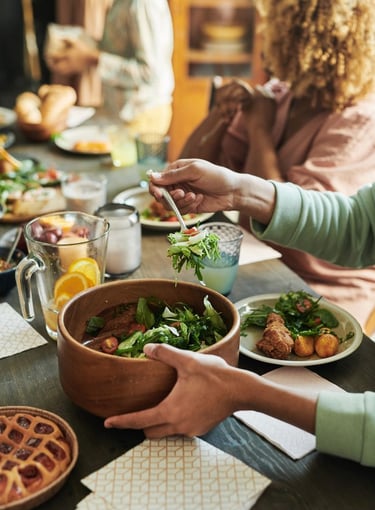
Food Guilt and the 'Cheat Meal' Trap: A Nutritionist’s Take
This article dives into the harmful effects of food guilt and the popular "cheat meal" mindset, revealing how they sabotage both mental and physical health. A nutritionist breaks down the psychology behind these patterns and offers practical strategies to help you build a healthier, guilt-free relationship with food.
HOME PAGEBLOG PAGE
Ayra Khan
7/9/20255 min read
In today’s world of hyper-dieting, calorie-counting apps, and wellness influencers, one of the most overlooked aspects of healthy eating isn’t what’s on your plate—it’s what’s going on in your mind. Enter: food guilt. More insidious than sugar and more prevalent than saturated fats, food guilt has woven itself into the fabric of our modern eating habits, often disguised under a seemingly innocent term—the "cheat meal."
As a nutritionist, I often come across clients who are doing “everything right” but still feel anxious or ashamed after indulging in a slice of pizza or a piece of chocolate cake. The pattern is familiar: days of strict eating followed by a moment of indulgence, then spiraling guilt, followed by compensation in the form of extra workouts or skipping meals. This cycle is not only mentally exhausting but also counterproductive to true health.
This article dives deep into the psychology of food guilt, dissects the “cheat meal” mentality, and offers evidence-based, compassionate strategies to help you develop a healthier, guilt-free relationship with food.
What is Food Guilt?
Food guilt is the negative emotional response—such as shame, anxiety, or self-criticism—that arises after eating certain foods, especially those labeled as “unhealthy” or “forbidden.” It’s often driven by rigid food rules, societal pressures, diet culture, and a perfectionist mindset around eating.
It typically shows up as:
Internal dialogue like: “I shouldn’t have eaten that,” or “I was so bad today.”
Punitive behaviors: Skipping meals, excessive exercising, or restricting food the next day.
Emotional distress: Anxiety, shame, or a sense of failure after eating something “off-plan.”
Over time, food guilt can damage your self-esteem, distort your understanding of nourishment, and even contribute to disordered eating patterns.
The Psychology Behind the “Cheat Meal” Concept
The term “cheat meal” implies wrongdoing. It suggests that eating anything outside your regular “clean” or “healthy” routine is a deviation that must be scheduled, justified, and often repented for.
From a behavioral psychology perspective, labeling food as “cheating” assigns moral value to what you eat. It divides food into binary categories:
Good vs. bad
Clean vs. dirty
Allowed vs. forbidden
This moralization of food reinforces the idea that our worth or success is tied to what we eat. As a result, people often feel virtuous after eating a salad and guilty after enjoying a slice of cake, even if both were consumed mindfully and within one’s nutritional needs.
What’s more dangerous is that the cheat meal mentality encourages binge behavior. When people know they’re “allowed” to cheat only once a week, they’re more likely to go overboard during that meal, leading to overeating and subsequent shame. This creates a harmful binge-restrict cycle that derails not just physical goals, but mental wellness too.
The Role of Diet Culture
Diet culture is a pervasive system of beliefs that equates thinness with health and moral virtue, glorifies self-control, and promotes weight loss as a cure-all for personal success and happiness.
This culture:
Encourages restrictive eating
Promotes detoxes and “clean eating” as the gold standard
Shames indulgence and hunger
Praises willpower over wellness
In this landscape, “cheat meals” are marketed as necessary “breaks” from rigid dieting—making people feel like they need permission to enjoy food. This is problematic because:
All foods have a place in a balanced diet.
You don’t need to earn your food.
Food should not be a source of anxiety or punishment.
Why Food Guilt is Harmful to Your Health
While many believe that guilt can serve as a motivator to "eat better," research shows otherwise. Food guilt can:
Increase stress hormones like cortisol, which can negatively affect digestion, blood sugar levels, and immunity.
Disrupt appetite-regulating hormones, making it harder to listen to natural hunger and fullness cues.
Lead to emotional eating, where food becomes a coping mechanism rather than nourishment.
Damage self-trust, making it harder to make confident, balanced food choices.
In contrast, eating from a place of permission and mindfulness fosters better metabolic function, emotional regulation, and even improved adherence to long-term wellness goals.
Rethinking the “Cheat Meal” Paradigm
Here’s the hard truth: if your nutrition plan requires you to "cheat" on it, it’s not a sustainable or healthy plan.
Instead of cheat meals, consider the concept of flexible eating or intentional indulgence—where all foods fit, and nothing is off-limits. This doesn’t mean eating ice cream for every meal, but it does mean allowing yourself the occasional treat without guilt or compensation.
A few shifts in perspective:
Swap “cheat meal” for “treat meal” or “joyful eating.” Language matters.
View food as a source of fuel, pleasure, and connection, not morality.
Remember: one meal does not define your health. It’s your overall pattern of eating that matters most.
How to Break Free from Food Guilt
Let’s explore evidence-based strategies that can help dismantle guilt and create a healthier relationship with food:
1. Practice Food Neutrality
Start by removing moral labels from food. Chocolate is not “bad.” Broccoli is not “good.” They are simply foods with different nutrient profiles. Food neutrality teaches you that all foods have value—some nourish the body, others nourish the soul.
2. Use Mindful Eating Techniques
Mindful eating emphasizes being present and non-judgmental during meals. It includes:
Eating slowly and without distractions
Tuning into hunger and fullness cues
Savoring flavors, textures, and aromas
Noticing emotions without reacting impulsively
Mindful eating fosters a deeper connection with food and helps prevent overeating or guilt.
3. Adopt the 80/20 Approach
The 80/20 rule suggests that 80% of your intake can be nutrient-dense, whole foods, while the other 20% can include soul foods or less nutrient-dense items. This balanced approach makes room for enjoyment without tipping into excess or deprivation.
4. Focus on Food Addition, Not Restriction
Instead of thinking about what you need to cut out, ask: What can I add to my meals to feel more nourished? This mindset helps reduce feelings of lack and reinforces positive food behaviors.
Examples:
Add greens to your pasta
Pair cookies with a source of protein
Enjoy dessert after a balanced dinner
5. Challenge Internalized Beliefs
Ask yourself:
Who taught me that eating this food is “bad”?
Is this belief helping or harming me?
What would I say to a friend who feels guilty for eating this?
Self-inquiry helps you separate your true values from diet culture’s conditioning.
Real Nourishment is Holistic
True nutrition isn’t just about macros, vitamins, or calories. It’s about mental peace, emotional connection, and self-respect. A slice of cake enjoyed at a birthday party with laughter and love might nourish you more than a protein bar eaten alone with guilt and shame.
You are not what you eat—you are how you eat, why you eat, and what you believe about what you eat.








Nutrition
Explore the latest in nutrition and diets.
Health
Wellness
ayra.azat@gmail.com
© 2025. All rights reserved.